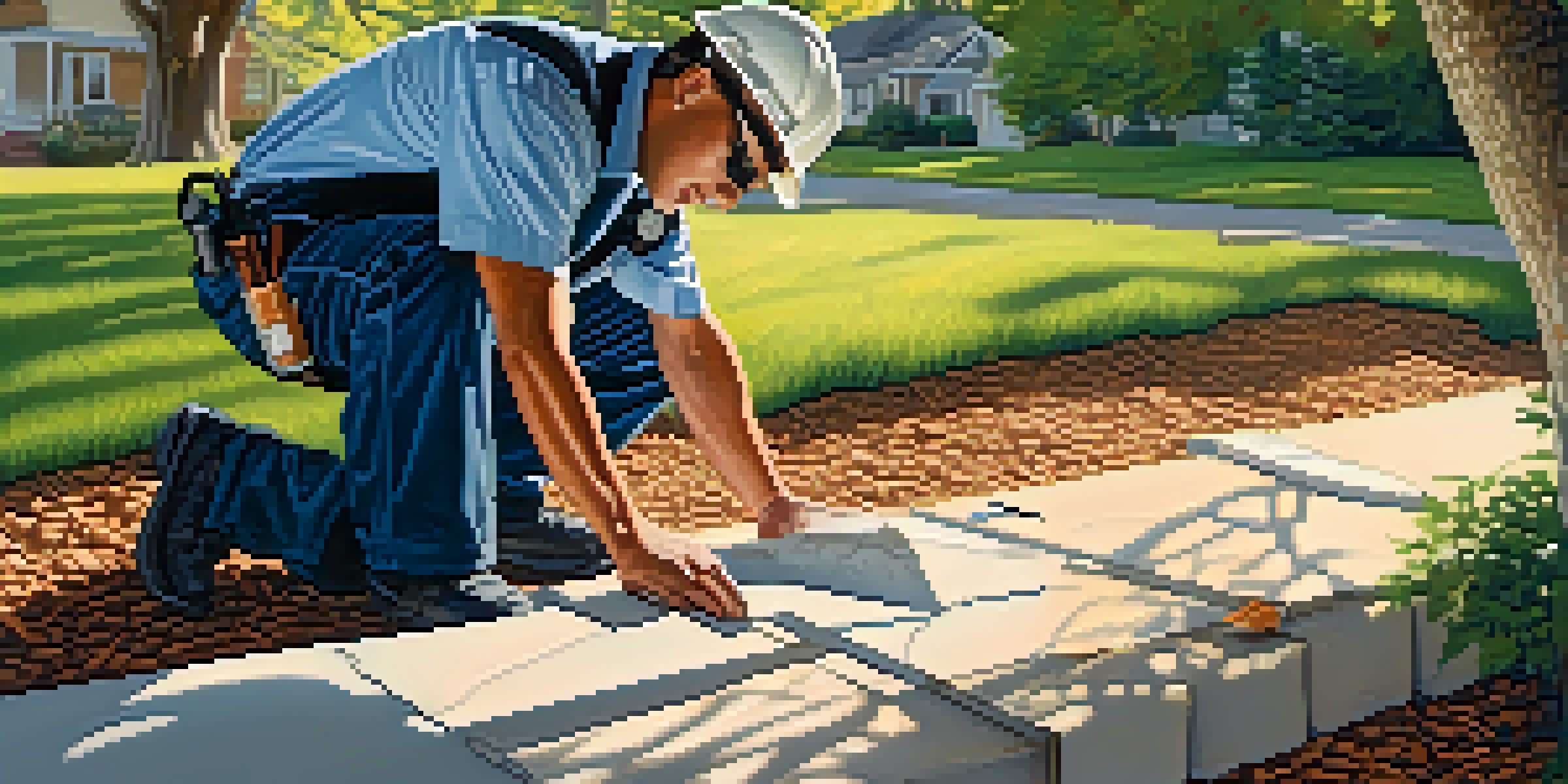How to Choose the Right Home Inspector for Your Needs

Understanding the Role of a Home Inspector
A home inspector plays a crucial role in the home buying process, acting as your eyes and ears. Their job is to evaluate the condition of a property, identifying potential issues that could affect its value or your safety. Think of them as a detective, meticulously searching for clues about the home's health.
An investment in knowledge pays the best interest.
Inspectors assess various components, including the roof, plumbing, electrical systems, and foundation. This thorough examination helps you make informed decisions about your investment. By understanding their role, you can better appreciate the importance of selecting the right inspector.
Ultimately, a qualified inspector provides peace of mind, ensuring that you’re aware of any hidden problems before you make one of the biggest purchases of your life. So, let’s delve into how to find someone who can provide you with this valuable information.
Checking Qualifications and Credentials
When it comes to hiring a home inspector, their qualifications and credentials are paramount. Look for professionals who are certified by recognized organizations, as this indicates they have undergone rigorous training. For example, inspectors certified by the American Society of Home Inspectors (ASHI) have met specific educational and experience requirements.

Additionally, check if they hold a state license, as many states require it to perform inspections. This requirement ensures they adhere to industry standards and regulations. It’s like ensuring your pilot has undergone the necessary training before flying you to your destination.
Importance of Home Inspections
A home inspector identifies potential issues in a property, ensuring you make informed decisions before a major purchase.
Finally, don’t shy away from asking about their experience. An inspector with years of hands-on experience will likely spot issues more effectively than a newcomer. The right credentials help assure you that you’re getting a knowledgeable professional.
Reading Reviews and Getting Recommendations
One of the best ways to find a reliable home inspector is through word-of-mouth recommendations. Talk to friends, family, or your real estate agent—they can provide insights based on firsthand experience. This approach often yields trustworthy candidates who have a proven track record.
The best way to predict the future is to create it.
Online reviews are another valuable resource. Websites like Yelp or Google Reviews allow you to see what other clients have said about their experiences. Just like checking a restaurant’s reviews before dining out, this can help you avoid any unpleasant surprises.
However, while reviews are helpful, take them with a grain of salt. Look for patterns in feedback rather than focusing on a single negative comment. Remember, every inspector can have an off day, but consistent praise or complaints can be telling.
Evaluating Their Inspection Process
Not all home inspectors use the same process, so it’s essential to understand how they conduct inspections. Some may offer a general overview, while others provide detailed reports with photos and recommendations. Ask potential inspectors about their methods to determine what aligns with your expectations.
A thorough inspection typically covers both visible and hidden elements of the home. For instance, an inspector should check for signs of water damage, pest infestations, and the quality of major systems like HVAC. It’s like a doctor conducting a full physical exam to ensure your overall health.
Qualifications Matter
Choosing an inspector with the right credentials and experience is crucial for a thorough and reliable home evaluation.
Additionally, inquire about the tools they use. Inspectors equipped with advanced technology, such as thermal imaging cameras, can detect issues that might not be visible to the naked eye. A detailed inspection process gives you a clearer picture of what you’re getting into.
Understanding Inspection Reports and Follow-Ups
After the inspection, you’ll receive a report detailing the findings, which is a crucial part of the process. Make sure the inspector provides a comprehensive and easy-to-understand report that outlines both major issues and minor concerns. Think of this report as your home’s health check-up results.
A good inspector will also be willing to discuss their findings with you, answering any questions you may have. This follow-up conversation can clarify any confusing points in the report, ensuring you fully understand the state of your potential new home. It’s like having a personal coach explain the game plan after a tough match.
Moreover, don’t hesitate to ask about recommendations for repairs or further evaluations. An inspector who offers guidance on how to address issues shows they are committed to your home-buying experience and care about your investment.
Inquiring About Insurance and Warranty
Before hiring a home inspector, it’s important to understand their insurance coverage. A qualified inspector should carry liability insurance, which protects both them and you in case of accidents or oversight during the inspection. This safety net ensures that you won’t be left high and dry if something goes wrong.
Additionally, some inspectors offer warranties on their services, which can provide extra peace of mind. For example, if issues arise shortly after the inspection, a warranty might cover the costs of further evaluations or repairs. It's like having a backup plan in case you drop your favorite phone.
Understanding Inspection Reports
A clear and comprehensive inspection report, along with follow-up discussions, is essential for understanding the home's condition.
Inquiring about these aspects not only shows that you’re thorough but also that you value your investment. Choosing an inspector with the right insurance and warranty can save you from headaches down the road.
Comparing Costs and Making the Final Decision
Cost is a significant factor when choosing a home inspector, but it shouldn’t be the only one. Prices can vary based on the inspector’s experience, location, and the size of the home. While you may be tempted to go for the cheapest option, remember that you often get what you pay for.
Take the time to compare costs among different inspectors while considering their qualifications and services. Sometimes paying a little more for a highly-rated inspector can save you thousands in potential repairs later. It’s like investing in quality shoes—your feet will thank you in the long run.

After weighing all these factors, trust your instincts and make a decision that feels right for you. Choosing the right home inspector is a crucial step in ensuring a smooth home-buying journey, and your peace of mind is worth every penny.